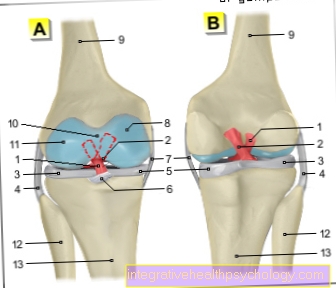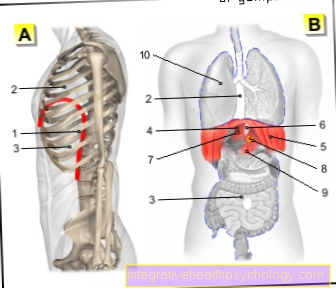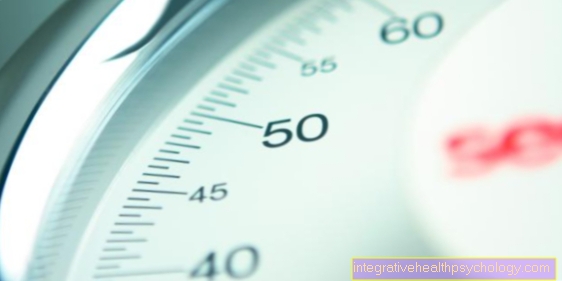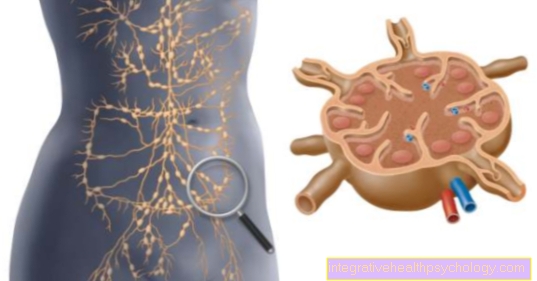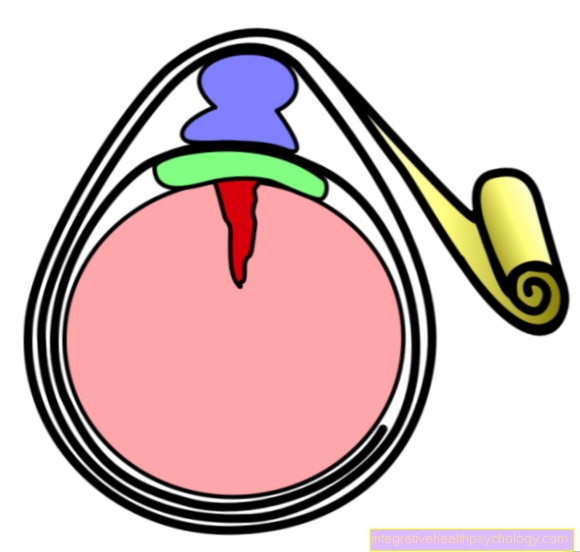Bloated stomach
definition
In the technical language, the bloated stomach is also referred to as "meteorism" and is often equated with the flatulence, the flatulence.
However, a bloated stomach initially only describes the accumulation of gas within the abdominal cavity. The gases can be in the free abdominal cavity, in the intestine or in other abdominal organs, but in the majority of cases the large intestine is responsible for the meteorism. Those affected first notice a bloated stomach due to the large, bloated and spherical belly, which can also exert pressure and be accompanied by cramps. In addition to normal room air, the gas accumulation can be various gaseous substances that can arise as products of metabolic processes in digestion and as part of certain diseases. A bloated stomach can be very harmless, but in rare cases it can also be a symptom of a threatening illness.

causes
The causes of a bloated stomach are numerous and can range from harmless digestive processes to dangerous intestinal blockages or inflammatory diseases of the abdominal cavity. The harmless causes are much more common, so that the bloated stomach does not initially give cause for concern.
- In the vast majority of cases, certain foods, drinks or drugs are behind the gas accumulation in the intestine. All food is broken down into its molecular components with the help of intestinal enzymes. Some foods are chemically engineered in such a way that the digestion process releases more gases that accumulate inside the intestines. Above all, this includes a very high-fiber diet, which includes, for example, cereals, legumes, cabbage or dried fruits. In addition, carbonated drinks can greatly increase the amount of gas in the intestine.
- Some people may also have a food intolerance. This is typical for celiac disease or lactose intolerance. The lack of enzymes to digest this food means that the substances are broken down under other chemical reactions with a significantly increased gas production.
- Inflammation of the abdominal organs can also be behind a flat stomach. These include infections of the gastrointestinal tract on the one hand, but also biliary tract and gall bladder inflammation or the acid-induced inflammation of the esophagus and stomach in gastroesophageal reflux disease. More rarely, dangerous inflammation of the pancreas or peritonitis may be responsible for the gas build-up.
- The bloated stomach can also be a symptom of serious illnesses that affect the general condition of the entire body. For example, an intestinal obstruction, heart failure, liver cirrhosis or irritable bowel syndrome as an underlying disease can result in a flat stomach.
For more information on this topic, also check out our main article: Causes of a bloated stomach
These drugs can cause bloating
Numerous drugs can also cause bloating. Medicines taken orally (by mouth), in particular, can cause meteorism when they break down in the stomach and intestines and through their effect on the gastrointestinal mucosa.
Commonly used agents that contribute to gas evolution are antibiotics and pain medication such as diclofenac. This is due to the changed gastrointestinal flora. When antibiotics are used, not only the harmful bacteria are killed but also numerous bacteria that are normally located in the intestine and play an important role in digestion. After ingestion, it takes a few days for the normal intestinal flora to regenerate and for the bloated stomach to subside.
In addition, a bloated stomach is caused by drugs that deliberately intervene in the digestion to treat certain diseases. These include, for example, laxatives or weight loss medication that are supposed to reduce the intake of food through the intestinal mucosa. Some diabetes medications can also cause the side effect of bloating. These drugs block the absorption of certain food components from the intestines into the blood so that the sugar level does not increase too much after eating. The bloated stomach is a harmless but often annoying side effect in these cases.
Also read: Side effects of antibiotics
Bloated stomach from antibiotics
Antibiotics are drugs that specifically attack and kill bacteria in order to combat stubborn bacterial infections or colonies.
The gastrointestinal tract, however, contains a number of bacteria that have no disease value and are important for the maintenance of the intestinal flora and the digestive system. They too are attacked by the antibiotics and their balance is disturbed. A short treatment of an acute infection is, however, much more harmless than permanent or long-term intake over several weeks. The digestion is significantly disturbed and the mucous membrane becomes more sensitive to infections and inflammation. This can lead to a bloated stomach but also new gastrointestinal infections.
Infection with the bacterium "Clostridium difficile", which occurs especially in hospitals after long antibiotic use, is typical. The infection leads to the clinical picture of pseudomembranous colitis.
Bloat from stress
An organic disease does not always have to be behind a flat stomach. Stress can also affect health, the intestinal flora and digestion in many ways.
In many people, the intestines are very sensitive to bad lifestyle habits and changes in exercise and eating behavior. In a stressful state one tends to do little sport and to maintain unhealthy eating habits. The so-called irritable bowel syndrome can also be favored by stress. Here, there is an increased sensitivity of the gastrointestinal tract, which can lead to inflammation and other symptoms. Infections in the gut can also be related to stress and irritable bowel syndrome. The immune system can be weakened by severe physical and psychological stress, which promotes inflammation and the development of irritable bowel syndrome.
Read more on this topic at: Irritable bowel - what to do
Flat stomach after an operation
A bloated stomach after an operation is a common complaint. This is due to the interplay of various physical changes immediately after the operation and in the days to weeks of regeneration.
A primary cause is physical inactivity during the acute recovery phase. Many patients are forced to lie down for days to weeks and often remain in bed much longer than necessary, especially during orthopedic operations. This hinders digestion and reduces the metabolism, which means that the food pulp lingers harder and longer in the intestine and a bloated stomach and flatulence can develop.
In addition, there is a change in diet, which can quickly lead to symptoms and complaints in a sensitive gastrointestinal tract. The hospital food after an operation is lighter than normal, but the symptoms in combination with the physical inactivity can be made easier by eating.
Depending on the procedure and follow-up care, various medications must be taken after the operation, which can have different effects on digestion. Antibiotics or pain medication in particular can cause the bloated stomach as a side effect.
Bloated stomach from coffee consumption
Coffee is regularly consumed by most adult people, although it can have side effects throughout the digestive tract. In addition to frequent heartburn and stomach pain, the drink can also cause a flat stomach.
The symptoms can, however, subside with increased and regular consumption, as a habituation effect sets in. Only heartburn can become chronic and worsen through coffee consumption. The bloated stomach is often secondary to the increased movement of the intestinal muscles. The increased muscle contraction and thus accelerated digestion mean that the food pulp often reaches the colon prematurely and undigested, where it is chemically broken down differently than usual by gas-producing bacteria.
To relieve symptoms and not go without coffee, Arabica beans that have been roasted for longer can be used first. Milk with coffee can also have a positive effect on symptoms in the gastrointestinal tract.
Bloated stomach from milk consumption
Milk is a very common cause of bloating. Many adult people have milk intolerance or intolerance to varying degrees.
Even if there is no complete intolerance, frequent consumption of large amounts of milk can lead to diarrhea, abdominal pain or a bloated stomach. This is due to the lack of the enzyme “lactase”. This breaks down the lactose contained in milk and other milk products. If the enzyme is missing, the lactose initially remains undigested, only to be broken down by gas-producing bacteria in later sections of the intestine. Almost all people reduce the production of the lactase enzyme in adulthood. In Asia and Africa more than 90% of the population are affected by such an enzyme deficiency.
Read more on this topic at: Lactose intolerance
Treatment of a bloated stomach
The treatment of a bloated stomach can be very different and must be made dependent on the cause of the symptoms.
An important basic therapy for a distended stomach, which does not apply to all underlying diseases, is the adjustment of diet and lifestyle habits. Flatulent foods should be put on the back burner, and gluten, lactose or fructose-free diets are ideal for any allergies or intolerances. If the bloated stomach persists, the long-term medication should be adjusted by the family doctor or the treating doctor. Chronic or infectious inflammation of the intestine may have to be treated with antibiotics, immunosuppressive drugs or other therapies under the supervision of a doctor.
More rarely, however, are serious organic diseases, cancer or diseases of the nervous and vascular system behind the bloated stomach. In these cases, individual treatments tailored to the underlying disease must be initiated by doctors in the hospital. In exceptional cases, surgical interventions on the intestine may be necessary in the case of certain diseases, which prevent a bloated stomach in the long term. In the event of recurring complaints, a healthy diet, sufficient exercise, conscious relaxation and sufficient drinking behavior should be observed as a preventive measure. These behaviors have a significant impact on digestion and intestinal health.
Read more on this topic at:
- Diet for indigestion
- Healthy eating
These drugs can help
If the bloated stomach cannot be treated with the help of diet and lifestyle habits, digestion can also be regulated and supported with medication.
In the case of constipation, so-called laxatives can be used in exceptional cases, which soften the stool and can treat a bloated stomach. Under no circumstances should they be taken too often, otherwise they will become used to them.
So-called probiotics can also support digestion. These are bacteria and microorganisms that have been taken in medication and that support the intestinal flora in its breakdown and digestion. Probiotics can be used in particular after taking antibiotics for too long, intestinal inflammation or irritable bowel syndrome.
The numerous underlying diseases that can be responsible for a bloated stomach often require drug therapies. Inflammatory bowel disease is most often treated with immunosuppressive drugs. However, these drug therapies still require extensive diagnostics to be performed by the direction of a doctor.
You might also be interested in this topic:
- Anti-flatulence drugs
- Lactulose
These home remedies will help
In most cases, a bloated stomach is just a harmless digestive problem and rarely requires medication or medically directed therapy.
Teas with various natural herbs can be used to increase the movement of the intestines, initially aim for flatulence and subsequently reduce the bloated stomach. Such teas can often be found in the supermarket as "belly tea" or "gastrointestinal tea". Important herbs that can be found in these teas and aid digestion are fennel, caraway, chamomile, anise, peppermint and ginger.
Exercise or a hot water bottle on the stomach can also reduce the bloated stomach.
You might also be interested in this topic:
- Home remedies for constipation
- Home remedies for a bloated stomach
Duration
The duration of the bloated stomach can vary widely.
In most cases, the symptoms are temporary, short-term digestive discomfort, which can occur especially after eating or during the passage of food in the large intestine. In these cases, a bloated stomach can persist for a few minutes to a few hours. Even with severe constipation, the bloated stomach often resolves itself within a maximum of two days.
If the problem persists, other underlying conditions must be considered. However, with the help of drug therapies, the symptoms of bloating can usually be resolved within a few hours. A recurring bloated stomach persists until the underlying disease has been adequately treated.
diagnosis
The examination of a bloated stomach can be done with various diagnostic means, whereby less invasive measures are carried out first.
In order to determine a bloated stomach, a detailed questioning and tapping the surface of the abdomen are sufficient. The latter allows a distinction to be made between normally filled intestinal loops and overinflation on the basis of the tapping sound. Furthermore, air accumulations in the abdomen can be easily visualized using the ultrasound examination. A distinction can also be made here as to whether the air is in the intestine, another abdominal organ or free in the abdominal cavity. Logs of the food, stool samples and a colonoscopy can provide more detailed information for a detailed examination of the digestion. If blockages or masses of the intestine are suspected, high-resolution computed tomography is still available.
Concomitant symptoms
The bloated stomach can, depending on its cause and the underlying disease, be symptom-free or be accompanied by strong, restrictive accompanying symptoms.
Flatulence only describes the accumulation of air within the abdomen, the most common accompanying symptom is flatulence, which is often confused with the flatulence. In addition to flatulence, diarrhea, constipation, abdominal pain and abdominal cramps can occur. All of these symptoms indicate indigestion in the intestines. In rare cases, complete intestinal blockages can occur, which are accompanied by severe abdominal pain and can be very dangerous.
Inflammation of the intestines can also cause fever, body aches, weakness and a reduced general condition. If the gall bladder and liver are involved in the abdominal complaints, targeted pressure pain in the upper abdomen and yellowing of the eyes and later also of the skin can occur. Less common accompanying symptoms of bloating are bloody stools, heartburn, weight loss, or anemia. All accompanying symptoms play an important role in the primary diagnosis in order to be able to assess the approximate organ area and the severity of the disease.
Read more on this topic at: Flatulence
stomach pain
Pain is one of the most common and important symptoms of bloating.
The severity of the pain allows conclusions to be drawn about the severity of the gas accumulation and the underlying complaints. The severe pain is also the most common reason to see a doctor, especially if it occurs every day. The pain is mainly caused by the pressure of the intestinal loops on one another, on the abdominal wall, on other organs and on the back and the nerve plexuses running there. Above all, the intestine itself is sensitive to pain, so that the stretching of the intestinal loops and the increase in pressure in the abdomen can cause unpleasant and sharp pain, similar to severe constipation. If you have a bloated stomach, it doesn't make sense to ignore the pain or treat it yourself with painkillers. Painkillers can suppress the pain, but make the problem worse. In an emergency, this can lead to dangerous intestinal blockages.
Read more about this under: Stomach pain
diarrhea
A bloated stomach is often associated with constipation and gas, which indicate reduced bowel movement and poor digestion.
In some cases, however, diarrhea can also be associated with the bloated stomach. This is due to inflammation of the gastrointestinal mucous membrane caused by bacterial pathogens. They can disrupt the digestion and breakdown of the food pulp and, in addition to liquefying the stool, cause gas production in the intestine.
After a longer phase of constipation, however, so-called "paradoxical diarrhea" can occur. Prolonged blockages in the intestine can break down solid stool from intestinal bacteria in such a way that it liquefies strongly. Due to the expansion and blockage of the food pulp, fluid can reflexively flow back from the blood into the intestine, which leads to a paradoxical diarrhea.
You might also be interested in this topic: Home remedies for diarrhea
constipation
Constipation is common in many people and is a typical disease of civilization.
They can be acute and chronic and have various causes. In most cases, acute constipation is caused by diet and exercise misconduct. It is mainly low-fiber meals, low fluid intake and lack of exercise that cause constipation. They lead to an overall harder stool and reduced movement of the intestinal muscles.
Prolonged constipation and difficult to digest food also lead to large accumulations of gas in the intestines, which also cause abdominal cramps, gas and pain. More rarely, metabolic diseases such as diabetes mellitus, neurological or muscular diseases or medication can also be responsible for constipation. Tumors of the abdomen are also conceivable. In addition to colon tumors, these can also be tumors of the ovaries or the uterus, which press on the intestines and block digestion.
Read more on this topic at: Home remedies for constipation
Back pain
Depending on the exact location of the flat stomach, the pain can also be felt in the back instead of in the abdomen.
In particular, deeper parts of the large intestine pull up to just before the tailbone and then flow into the rectum. Bloated loops of intestine can put pressure on the spine and the plexus in front of the coccyx in the deep sections of the intestine, causing pain in the lumbar region and the entire lower back.
If orthopedic complaints of the back are excluded, rheumatic diseases of the spine can also explain the back pain in rare cases. Some rheumatic diseases cause intestinal problems and changes in the spine at the same time. Another rare cause of back pain is the pancreas. If the inflammation changes, digestive complaints can also be accompanied by sharp pain in the thoracic spine.
You might also be interested in this topic:
- Back pain
- Therapy of back pain
Is there also a bloated stomach without gas?
A bloated stomach primarily describes a gas accumulation of air in the abdomen, but not yet so-called "flatulence".
In the majority of cases, the bloated stomach is located within the intestine, often within the large intestine, from which gas later develops. A bloated stomach can also take place entirely without gas, for example if a severe constipation holds up both the air and the food in the intestine. Digestive enzymes can also help a bloated stomach go away on its own without causing gas. A certain amount of flatulence escapes the body permanently without noticing it. Flatulence only occurs when large amounts of gas suddenly escape from the intestine.
Read more on this topic at: Causes of Flatulence
Flat stomach after eating
In the most common cases, bloating occurs shortly after eating.
Difficult underlying diseases are rarely behind the bloated stomach, much more often the symptom can be attributed to an incorrect diet and eating habits. Typically, the bloated stomach occurs after consuming legumes, fiber, cabbage, and carbon dioxide. Fruits, milk or foods containing gluten can also trigger a bloated stomach in many people. In these cases a full diet of these foods must be considered. After a while, the intestines get used to a high-fiber and bloating diet. Since dietary fiber is important and healthy for the intestinal flora, you should get used to it slowly when changing your diet.
Read more on this topic at: Bloated stomach after eating
Bloat in pregnancy
Women during pregnancy have an above-average number of problems with a flat stomach. This is not due to an underlying disease, but rather to the interaction of several negative influencing factors on digestion.
On the one hand, the stresses of pregnancy can lead to incorrect eating habits, which can result in digestive problems. A sedentary lifestyle, which makes the intestine sluggish, often sets in in pregnant women. Certain pregnancy hormones can also relax the intestinal muscles and support the indolence. A bloated stomach, constipation and flatulence can result. In late pregnancy, an increase in the size of the uterus can also worsen the symptoms. Pressure on the intestinal loops and the stomach can cause minor blockages and the passage of food can also be impeded.
Read more on this topic at:
- Flatulence in pregnancy
- Constipation in Pregnancy
Bloated stomach in menopause
The rapid hormonal changes in the woman's body are responsible for a bloated stomach during menopause.
Digestive complaints, bloating and flatulence represent a very common problem for women at the beginning of menopause. The hormones involved are primarily "progesterone" and "prostaglandins". Both have different effects on the body's functions and can decrease and increase rapidly at the beginning of the menopause and thus cause unpleasant fluctuations. An increase in prostaglandins initially counteracts the bloated stomach, as they increase the movement of the intestinal muscles. Nevertheless, due to their increased intestinal activity, the prostaglandins lead to digestive problems, pain and abdominal cramps. Opposite them is the hormone progesterone, which leads to a slackening of the muscles. The chyme remains in the intestine for too long, which can lead to constipation, a bloated stomach and pain.
If the symptoms are too severe, the hormone fluctuations can be treated with medication.
Further information on this: Menopause symptoms

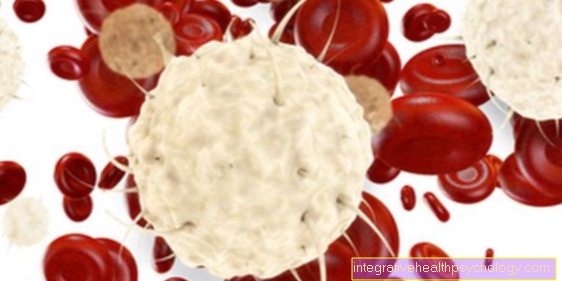


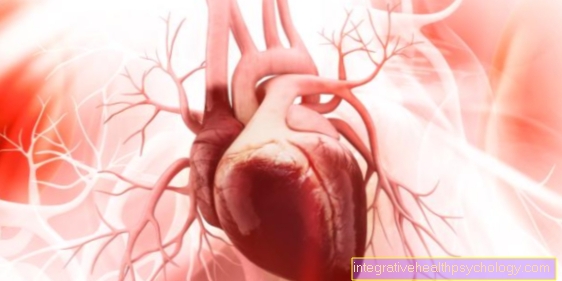

.jpg)
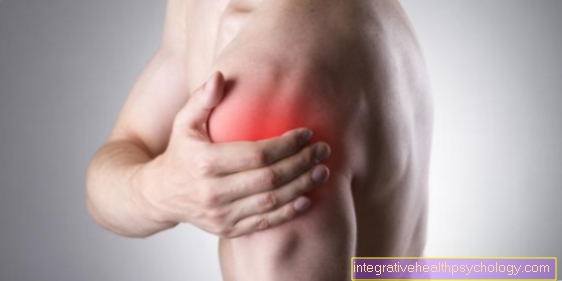


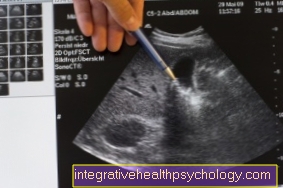
.jpg)


